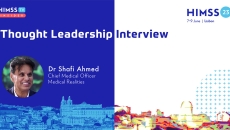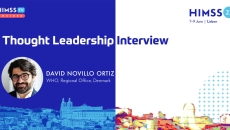Videos
Health systems today are looking at deploying emerging technologies like the metaverse and ChatGPT, but putting them to good use may be challenging, says Aster DM Healthcare Group CIO Veneeth Purushotaman.
AICEP's chairman, Filipe Santos Costa, explains how Portugal attracts tech startups while also optimising infrastructure, licensing and financial incentives to bring in pharma companies.
HIMSS Davies Award winner Texas Children's Hospital’s assistant VPs Tarra Kerr and Ashok Kurian discuss their patient-centered coordinated care, enabled by a partnership between quality and safety departments, clinical operations and IT systems.
At the HIMSS 2023 Healthcare Cybersecurity Forum, Dr. Christian Dameff, medical director of cybersecurity for the University of California San Diego, will address bringing all stakeholders to the table to talk about protecting care quality.
Saudi Arabia's Ministry of National Guard Health Affairs broke records by achieving HIMSS stage 7 in four models concurrently. Raed Alhamze explores the impact on patient outcomes.
Anjali Kataria, Mytonomy CEO and cofounder, says that content streaming and AI can empower patients at home and help hospitals and health systems improve their patient education materials as they reduce the time nurses spend answering questions.
Romel Khalife, UAE and Kuwait GM at Oracle Health shares his insights about the company's vision, highlighting its role in promoting security, reliability, innovation, and resource planning, all within a single strategic framework.
According to the UK's Dr Shafi Ahmed, to meet the workforce squeeze, health systems need to plan better, change training radically and introduce flexible career paths that allow for periods of teaching or innovating.
The commitment to telehealth from CMS offers medical specialties the freedom to innovate and provide better and more equitable care, says Dr. Robert Murry, chief medical officer of NextGen Healthcare and a practicing family physician.
According to WHO-Europe's David Novillo Ortiz, four key e-health strategies (tech guidance, enhancing capacity, knowledge exchange and scaling up things that work) are deploying to address workforce and health equity challenges across the region.









